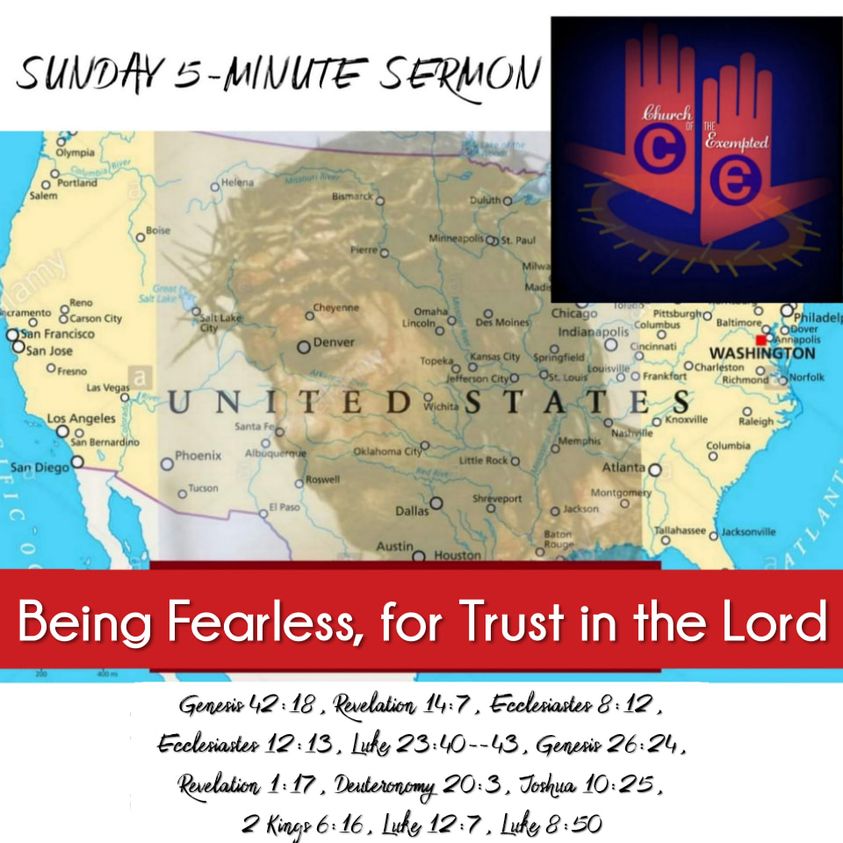Genesis 42:18, Revelation 14:7, Ecclesiastes 8:12, Ecclesiastes 12:13, Luke 23:40--43, Genesis 26:24, Revelation 1:17, Deuteronomy 20:3, Joshua 10:25,
2 Kings 6:16, Luke 12:7, Luke 8:50
- Damonous
- February 27, 2022
- Go to video
Fear. It’s the one thing in our lives which remains most constant. Instinctively, fear instructs us at a primal level, making us fend for ourselves –protect ourselves, and acquire all that we need to sustain our lives. Fear is therefore something that seems to be necessary and valuable, but it can also easily lead to selfishness in our ways.
In the story of America, it’s interesting how we’ve come over the decades (centuries?) from a fearless society, to one so fearful of real or imagined dangers, that today a good portion of the populace still voluntarily walks around with masks on, long after mandates have diminished or disappeared. How many businesses still sadly enforce such mandates on their employees, in fear of being sued for an “outbreak”?
Yet, while decades of cultural abundance and security have made us fearful in our ways, we’ve strangely become quite fearless when it comes to our God, often letting Him be diminished or mocked, in contradiction to His law. The words “fear God” appear 10 times directly together, across the Bible, from Genesis to Revelation. In Genesis 42:18, Joseph the son of Israelite leader Jacob said, “This do, and live; for I fear God.” In Revelation 14:7, an angel of the Lord declares: “Fear God, and give glory to him; for the hour of his judgment is come.”
We can as well see a picture being painted that fear of the Lord is tied to the very gift of forgiveness. In the Old Testament in Ecclesiastes 8:12, we have such an incredible verse that portends of Christ’s forthcoming salvation, while confirming a requirement for attaining it: “Though a sinner do evil an hundred times, and his days be prolonged, yet surely I know that it shall be well with them that fear God, which fear before him.” We are also told in Ecclesiastes 12:13 to “Fear God, and keep his commandments: for this is the whole duty of man.” When Jesus was hanging upon the Cross in the record of the New Testament, one of the two criminals that hung on crosses beside Him, mocked His power. This caused the other scoundrel to come to His defense, saying, “Dost not thou fear God, seeing thou art in the same condemnation?” In turn, he proceeded to beg of Jesus: “Lord, remember me when thou comest into thy kingdom.” To which Jesus responded, “Verily I say unto thee, To day shalt thou be with me in paradise.” (Luke 23:40–43)
So, we can see that today’s offensive society, wherein it has even become fashionable to question and openly mock God, as well as those who believe in Him, is completely on a path opposed to any hope of His salvation.
Interesting then, that this same sentiment in society is also backwards of another frequent command throughout the Bible: “fear not”, which appears verbatim 62 times. Again, going front-to-back in the Bible, in Genesis 26:24 God promises that, “I am the God of Abraham thy father: fear not, for I am with thee, and will bless thee, and multiply thy seed for my servant Abraham’s sake.” And in Revelation 1:17, Jesus lays hand and revives John from a fall into lifelessness: “Fear not; I am the first and the last.”
Many times throughout the Bible, we are instructed to be fearless of what men or things of this Earth or even death can do to us, because we fear and trust in God, instead. In Deuteronomy 20:3, God says to His favored Nation: “Ye approach this day unto battle against your enemies: let not your hearts faint, fear not, and do not tremble, neither be ye terrified because of them.” In Joshua 10:25, Joshua repeats to his people almost verbatim what the Lord had told him previously: “Fear not, nor be dismayed, be strong and of good courage: for thus shall the Lord do to all your enemies against whom ye fight.” So, we see that in order to overcome our enemies, we must be fearless, and trust that the Lord will be our champion in times of trouble.
The Bible holds so much instruction on fearlessness, some passages have become commonplace even for the unbelieving to hear or repeat, such as 2 Kings 6:16: “Fear not: for those who are with us are more than those who are with them.” and Luke 12:7: “But even the hairs of your head are all numbered. Fear not: you are of more value than many sparrows.”
The topic of fear, and how the Bible tells us to deal with it, is quite extensive to boil down to just five minutes, but it should nonetheless be quite clear by now that the underlying instruction is to fear God only; not man or the things that be.
Luke 8:50 tells of a most extraordinary moment, when Jesus raises the dead. He tells the father of a dead child: “Fear not: believe only, and she shall be made whole.”
“Fear not: believe only”
Words spoken by our Lord and Savior. Take comfort in it; take comfort in Him, who is willing to redeem.
The Lord be with you all. May you find strength to overcome fear, in Jesus’ name, amen.

